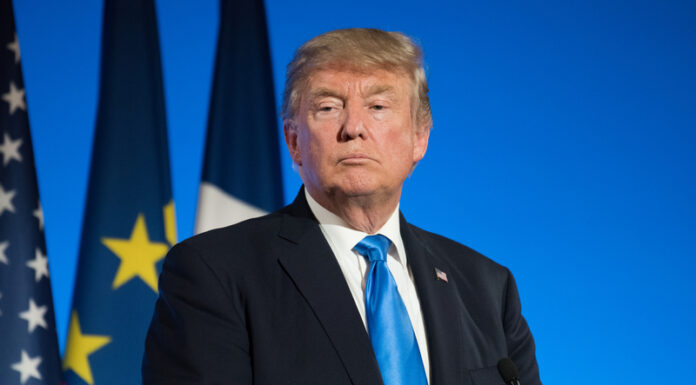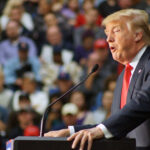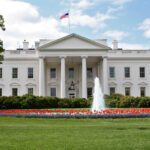President Donald Trump has commented on the distinctions between his two presidencies in a new interview with The Atlantic, released on Monday, April 28, 2025, asserting that he now leads both “the country and the world.”
“The first time, I had two things to do — run the country and survive; I had all these crooked guys,” Trump stated in the interview. “And the second time, I run the country and the world.”
Since taking office again in January, Trump has wielded significant executive power across various policy domains. His immigration and trade policies have been particularly controversial. His administration’s stringent deportation measures have encountered numerous legal challenges, yet Trump remains steadfast in defending them.
The president’s trade policies have unsettled global markets and strained relations with longstanding U.S. allies. Trump has announced extensive tariffs impacting most nations, including key U.S. trade partners, although he has temporarily suspended some specific tariffs until July. This unpredictability in trade actions has increased global economic anxiety.
Supporters describe Trump’s trade strategy as a negotiation tool, with billionaire Bill Ackman praising it as “brilliantly executed,” according to BBC reporting. However, the tariffs have drawn criticism from economists and some Republican senators, with one labeling the 10% baseline rate “bad.”
Trump’s economic policies are also altering global security relationships. As per Chatham House, European and Asia-Pacific allies are re-evaluating their reliance on the U.S. for security due to Trump’s tariffs. European countries are enhancing their defense capabilities and reducing dependence on U.S. military equipment, potentially creating competitive defense industries.
Trump has attracted attention with remarks about acquiring Greenland and suggesting Canada could join the United States. Meanwhile, he has devoted significant time to attempting to broker a ceasefire between Russia and Ukraine.
When asked about the likelihood of pursuing a third term, Trump showed reluctance. “It’s not something that I’m looking to do. And I think it would be a very hard thing to do,” he told The Atlantic. However, he reportedly hinted at the possibility during a rally in Michigan despite it being unconstitutional.
Trump noted that wealthy elites have treated him with more respect during his second term, highlighting improved relations with billionaires like Jeff Bezos and Mark Zuckerberg.
The president also addressed internal administration challenges, particularly concerning Defense Secretary Pete Hegseth, who has been scrutinized for the Signal scandal and Pentagon issues. Trump supported Hegseth, saying he would “get it together.”
Regarding his immigration policies, Trump acknowledged that perfection is not possible. He told The Atlantic that deportation efforts would never be flawless, suggesting that some errors might occur.
At a past rally in Detroit, Michigan, that resembled a campaign event, Trump declared his administration had achieved “the most successful first 100 days of any administration.” During the event, he emphasized his immigration policies, including “mass deportation” efforts, and defended his protectionist trade stance despite criticism.
In an ABC News interview, Trump dismissed concerns about potential economic issues from his tariff policies, telling reporters, “Everything’s going to be just fine,” according to The Washington Post.
The administration has attempted to mitigate some tariff impacts, especially for automakers, while criticizing Amazon’s plan to disclose how tariffs affect product prices.
Now that President Donald Trump’s second term has reached the 100-day milestone, public approval has declined markedly, and legal scrutiny of his administration’s policies and statements has increased.
In his recent interview with The Atlantic, Trump claimed leadership over the nation and the world, a statement criticized by political analysts and legal experts. They argue that such statements suggest an overreach of executive power and disregard for constitutional limits. Legal scholars note that Trump’s assertion of global leadership lacks legal grounding and could challenge democratic governance principles.
Public opinion echoes these concerns. A PBS News/NPR/Marist poll shows nearly half of Americans rate Trump’s performance poorly, with approval ratings at around 39%—the lowest for any president at this stage in decades. Criticism spans immigration, trade, and foreign policy. His deportation policies have faced legal challenges, and his tariffs are blamed for economic instability and strained international ties.
Trump’s statements have also drawn judicial attention. Courts have blocked several executive orders, emphasizing checks and balances. For example, federal judges have halted specific immigration policies, citing constitutional violations. Legal experts warn that Trump’s rhetoric and actions could undermine the rule of law and set concerning precedents.
Despite these issues, Trump maintains a loyal base. Supporters argue his bold approach is necessary to disrupt the status quo and implement needed reforms. However, the growing rift between the executive branch and other institutions highlights the contentious nature of his presidency.
As Trump’s second term progresses, the interaction between his administration’s power assertions and responses from the public and legal system will continue to influence the political landscape. Observers remain attentive to how these dynamics evolve and their implications for American democracy.








